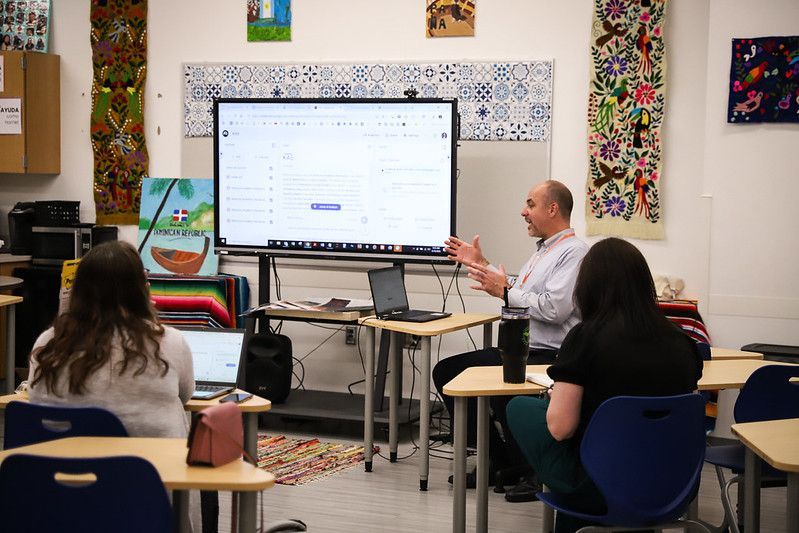
redesigning education for an AI era: lessons from Kentucky’s local accountability movement
Artificial intelligence is reshaping our world at an unprecedented pace, yet most education systems remain stuck in outdated models that emphasize standardized testing and rote memorization. TheLearning Policy Institute’s blog on educating for the AI era issues an urgent call to action: schools must shift now to prepare students with skills AI cannot replicate, such as critical thinking, creativity, collaboration, and adaptability.
Across Kentucky, a bold transformation is already underway. Through theKentucky United We Learn initiative, districts such asGreenup County Schools,Allen County Schools, andFleming County Schools are pioneering local accountability systems that move far beyond state test scores. These districts are building dashboards, developing graduate profiles, and designing vibrant learning experiences that measure what students truly need to thrive in an AI-driven economy.
why content-based learning falls short in an AI world
As Kentucky education leader David Cook said during a recent forum on local accountability, “The world is not content-based; it’s skills-based. Content is going to change. What we need is kids who know how to learn.”
This insight reflects the Learning Policy Institute’s key message: in a rapidly changing world, students must become lifelong learners who can adapt to new challenges, rather than simply memorize static information.
kentucky’s innovative approach to local accountability
Kentucky’s response is both groundbreaking and practical. Districts are co-creating local accountability systems grounded in community-defined priorities that measure critical skills traditional tests overlook, such as:
- Are students able to effectively collaborate with each other and their community?
- Are they developing creativity, resilience, and critical thinking?
- Are graduates equipped with real-world skills aligned to their community’s needs?
InGreenup County Schools’ local accountability efforts, quarterly dashboards track more than academic performance. They include certifications earned, community partnerships formed, and student social-emotional growth. These measures are made visible through public-facing dashboards and shared stories on social media.
InAllen County Schools, educators have built a system anchored to their locally developed Profile of a Patriot. This model tracks student progress across cross-curricular competencies, ensuring education prepares every learner for success in today’s economy. Allen County plans to publicly launch their comprehensive dashboard in the near future.
InFleming County Schools’ Measures of Quality, educators have created a dynamic, community-centered accountability system that includes student portfolios, defenses of learning, and metrics for key competencies identified by local stakeholders. Fleming’s system is already being recognized across Kentucky as a model for how local accountability can make learning relevant, rigorous, and community-supported.
moving from standardization to collaboration in education
One of the most powerful themes emerging from Kentucky is a shift away from competition toward collaboration among school districts. Instead of focusing on standardized comparisons, districts are working together to share strategies and build collective capacity so all students benefit.
This approach aligns with the Learning Policy Institute’s call to redesign education so it fosters vibrant, student-centered learning rather than outdated compliance models.
communication and storytelling are essential
Redesigning accountability systems alone will not ensure success. For communities to support these bold changes, they must see, understand, and believe in them. Clear, compelling communication transforms innovative ideas into shared commitments. Schools need support translating complex dashboards into accessible visuals, crafting narratives that explain new measures of success, and sharing stories that bring student growth to life.
At The Alchemy Collaborative, we believe this is where our work matters most. We partner with school districts to turn data into meaningful stories, design visuals that make learning visible, and build communication systems that earn trust. By helping districts connect with families, staff, and local stakeholders, we make it easier for communities to rally around the kind of vibrant, student-centered learning Kentucky’s accountability redesign aims to create.
Organizations like thePritchard Committee for Academic Excellence and the University of Kentucky’s Next Generation Leadership Academy are also playing key roles in supporting communication efforts across the state. Together, we can ensure that every community understands and supports this transformational work.
a roadmap for other states
Kentucky’s work on local accountability offers a powerful blueprint for how education systems can better prepare students for an AI-powered world. By designing accountability systems with communities instead of imposing them from above, measuring essential skills beyond test scores, and ensuring every student is seen and supported, Kentucky is building schools where all learners can thrive in a world that is constantly changing.
At Alchemy Collaborative, we believe that this kind of bold redesign requires more than new frameworks; it needs communication that brings people together around a shared vision. We partner with districts to make these local accountability stories clear, inspiring, and actionable for families, educators, and community leaders. Our work helps districts show not just what they are measuring, but why it matters for every student.
As the Learning Policy Institute reminds us, the time for schools to evolve is now. Kentucky’s example shows what is possible when states rethink outdated systems and invest in authentic, community-centered communication.
Together, we can help more communities step boldly into the future of learning.








